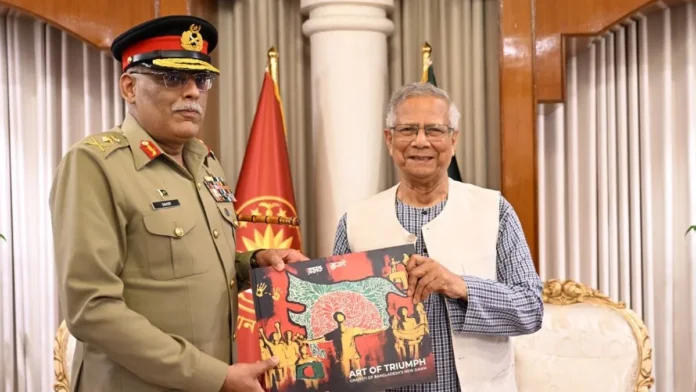Introduction
A diplomatic and political controversy erupted on Monday after reports surfaced that Bangladesh’s interim government chief, Dr. Muhammad Yunus, allegedly presented a symbolic map to a visiting Pakistani military general, which appeared to depict India’s Northeast region as part of Bangladesh. The incident has triggered strong reactions across India and Bangladesh, raising questions about the intent behind the gesture and its potential geopolitical implications.
The Controversial “Gift”
According to local media reports from Dhaka, Dr. Yunus presented a framed historical map to Lt. Gen. (Retd.) Ahmed Tariq, a visiting Pakistani military official, during a private ceremony at the Bangabhaban Guest House last week.
What made the gift controversial was a border outline on the map that, according to observers, extended beyond Bangladesh’s actual territory, showing parts of India’s Northeast — particularly Assam and Tripura — shaded within Bangladeshi borders.
While Yunus’ office described it as a “symbolic gift representing historical Bengal culture”, critics in both Bangladesh and India called it “a grave diplomatic blunder” and “an affront to India’s sovereignty.”
Political and Public Backlash in Bangladesh
Bangladesh’s political circles reacted sharply to the reports.
The Awami League, which was ousted earlier this year following mass protests, accused Yunus of “undermining national interests” and “playing into foreign agendas.”
“Dr. Yunus has insulted the spirit of our liberation war and endangered relations with our closest neighbour,” said Obaidul Quader, senior Awami League leader. “No map or symbolic gesture can erase the blood bond between India and Bangladesh.”
On social media, hashtags like #YunusMapScandal and #RespectIndianBorders began trending in both Bangladesh and India within hours of the story breaking.
India Seeks Clarification
In New Delhi, the Ministry of External Affairs (MEA) said it had sought official clarification from Dhaka over the reports.
“We are aware of the media coverage and are in contact with Bangladeshi authorities to verify the facts,” an MEA spokesperson stated. “India’s territorial integrity is non-negotiable.”
Indian security and diplomatic analysts called the episode “deeply concerning,” especially given Yunus’ current role as head of Bangladesh’s interim administration, which came to power after the ouster of former Prime Minister Sheikh Hasina in July.
Pakistan’s Response
The Pakistan Foreign Office downplayed the controversy, saying that the map was “a cultural artefact gifted in goodwill” and not an official document.
However, several Pakistani media outlets praised the gesture as a “symbol of regional friendship,” further fueling outrage in Dhaka and New Delhi.
Experts Warn of Geopolitical Fallout
Experts on South Asian geopolitics warned that the incident could strain relations between India and Bangladesh, especially at a time when both countries are already navigating a delicate post-Hasina political landscape.
“Symbolism in diplomacy carries immense weight,” said Dr. Harsh Pant, an international relations expert at King’s College London. “Whether intentional or accidental, this episode risks reopening old mistrusts between Delhi and Dhaka.”
There are also concerns that Pakistan and China may attempt to exploit the controversy to drive a wedge between the two neighbours, particularly in the context of India’s growing role in regional connectivity projects.
Yunus’ Office Issues Damage Control Statement
Facing mounting criticism, the interim government’s press wing issued a late-night statement clarifying that the map was “an artistic representation of the Bengal delta and its ancient trade routes”, not a political one.
It also claimed that the controversy was being “deliberately misinterpreted by vested interests” to destabilize Yunus’ administration.
Despite the clarification, protests erupted in Dhaka University and Chittagong, with demonstrators demanding Yunus’ resignation and a public apology to India.
Conclusion
The so-called “map gift” controversy has once again exposed the fragile undercurrents in South Asia’s regional politics, especially between India, Bangladesh, and Pakistan.
While the Bangladeshi interim government insists it was an innocent cultural gesture, critics argue that symbols matter in diplomacy, and this one could have lasting diplomatic consequences if not swiftly addressed.



